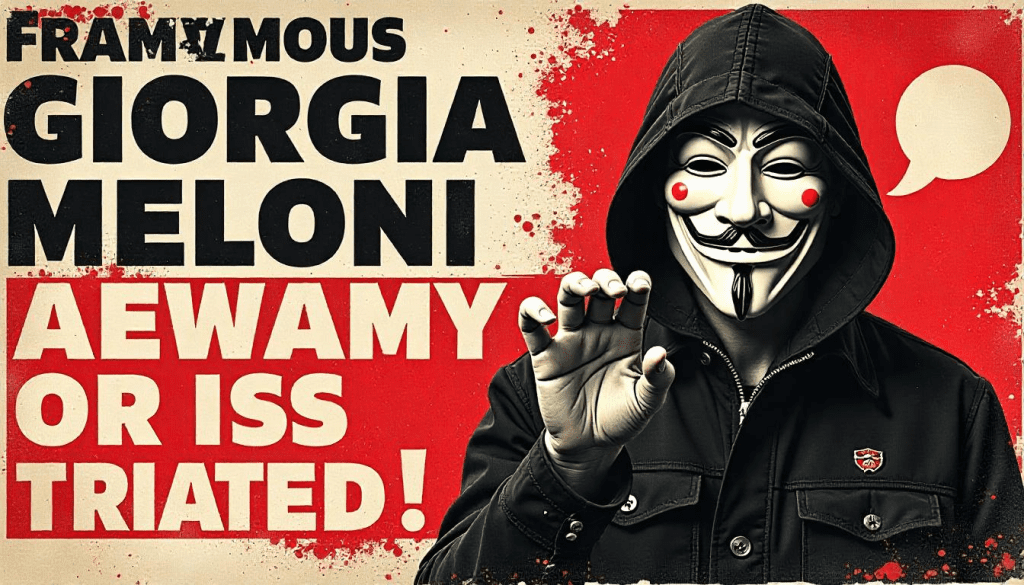In recent years, the world has witnessed an increasing clash between governments and digital activists. One such case that has drawn significant attention is the conflict between Anonymous, the decentralized hacktivist group, and Giorgia Meloni, the Prime Minister of Italy. This battle represents a larger struggle between authority and digital resistance, raising questions about freedom of speech, government control, and the power of cyber activism.

Who is Giorgia Meloni?
Giorgia Meloni is a far-right political leader and the current Prime Minister of Italy. She is the leader of the Brothers of Italy (Fratelli d’Italia), a nationalist and conservative party that has gained popularity due to its strong stance on immigration, traditional values, and sovereignty. Since taking office, Meloni has implemented policies that align with her party’s ideology, including stricter immigration laws and conservative social reforms.
Her leadership has been praised by some as a step toward national stability and self-reliance. However, critics argue that her policies lean towards authoritarianism, limiting freedoms, and suppressing opposition. This has made her a target for various activist groups, including Anonymous.
Who is Anonymous?
Anonymous is a loosely organized, decentralized group of hacktivists known for cyberattacks against governments, corporations, and institutions they view as corrupt or oppressive. The group operates without a clear leadership structure, using their skills to expose, disrupt, and challenge those in power. Their activities often involve website defacements, data leaks, and distributed denial-of-service (DDoS) attacks.
Anonymous has historically targeted governments and institutions involved in censorship, corruption, or human rights abuses. Their slogan, “We are Anonymous. We are Legion. We do not forgive. We do not forget. Expect us,” reflects their mission to hold the powerful accountable.
The Conflict Between Anonymous and Giorgia Meloni
The tension between Anonymous and Meloni stems from her policies on digital freedom, surveillance, and free speech. Some key aspects that have fueled this conflict include:
1. Government Censorship and Surveillance
Meloni’s government has been accused of increasing digital surveillance and controlling online narratives. Anonymous views this as a threat to freedom of expression and individual privacy. They argue that government control over the internet leads to the suppression of dissenting voices, a hallmark of authoritarian regimes.
2. Immigration Policies and Human Rights
Meloni’s hardline stance on immigration has been widely criticized. Anonymous has a history of supporting refugee rights and has condemned policies that limit asylum seekers’ access to safety. The group has used cyber activism to expose government actions that they believe violate human rights.
3. Media Control and Misinformation
Anonymous has accused Meloni’s government of manipulating media narratives to suit political interests. They argue that the suppression of independent journalism and the spread of biased news create a misinformed public. In response, the hacktivist group has worked to leak information and disrupt government-controlled narratives.
4. Cyberattacks on Italian Government Websites
In response to Meloni’s policies, Anonymous has allegedly launched multiple cyberattacks on Italian government websites, disrupting services and exposing sensitive data. These attacks serve as both a protest and a warning to political leaders who attempt to impose restrictive policies on digital freedoms.
Public Reactions and Impact
The battle between Anonymous and Giorgia Meloni has drawn mixed reactions from the public.
- Supporters of Meloni view Anonymous as a group of cybercriminals who undermine national security and interfere with democratic governance. They argue that elected officials have the right to enforce policies that reflect the people’s will, and cyberattacks set a dangerous precedent.
- Supporters of Anonymous see the group as digital freedom fighters exposing corruption and authoritarian policies. They believe that cyber activism is a necessary tool in the modern age to hold leaders accountable.
The Bigger Picture: Cyber Activism vs. Political Power
The clash between Anonymous and Giorgia Meloni highlights a broader global issue: the struggle between cyber activism and political authority. Governments worldwide are tightening digital controls, increasing surveillance, and attempting to regulate online spaces. Meanwhile, hacktivist groups continue to challenge these measures, advocating for transparency, free speech, and digital rights.
This conflict raises important questions:
- Should hacktivism be considered a form of legitimate protest, or is it cybercrime?
- How can governments balance national security with individual freedoms?
- What role should digital activists play in modern political landscapes?
Conclusion
The battle between Anonymous and Giorgia Meloni is not just about one leader or one group—it represents a larger ideological struggle in the digital age. While governments seek control over information and security, hacktivists push for transparency and freedom. Whether one sees Anonymous as heroes or villains depends on perspective, but one thing is clear: the fight for digital freedom is far from over.